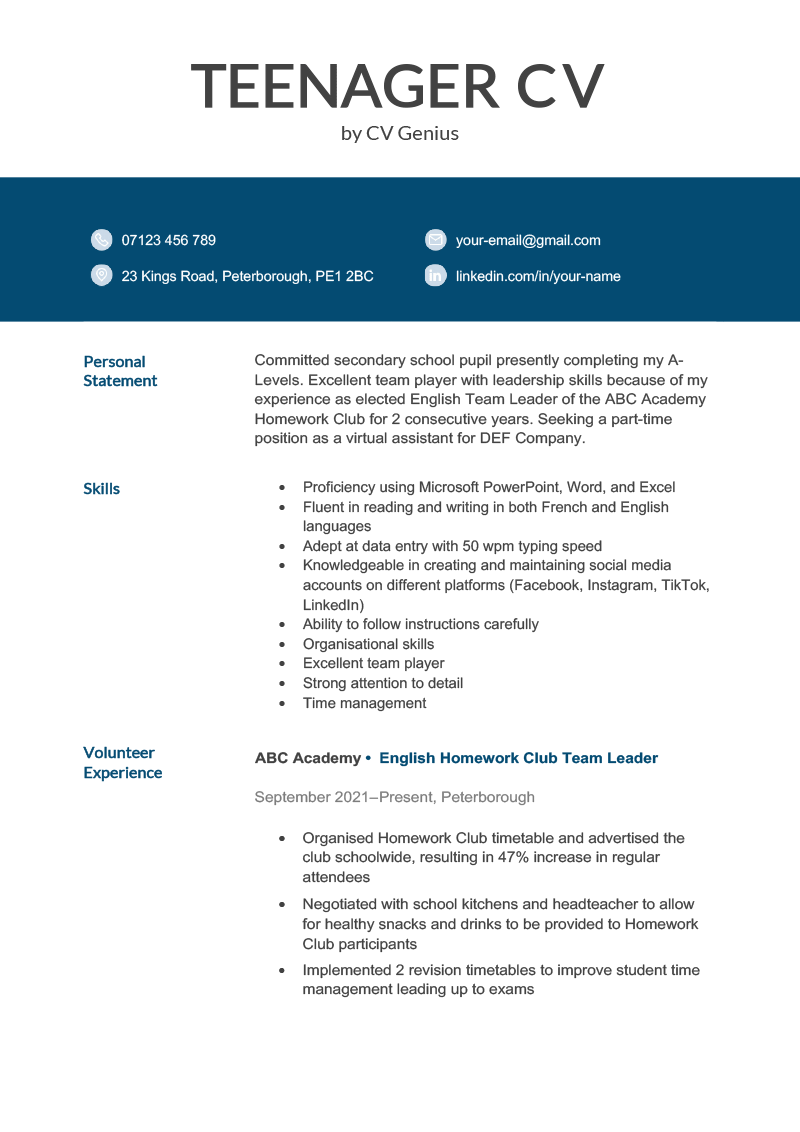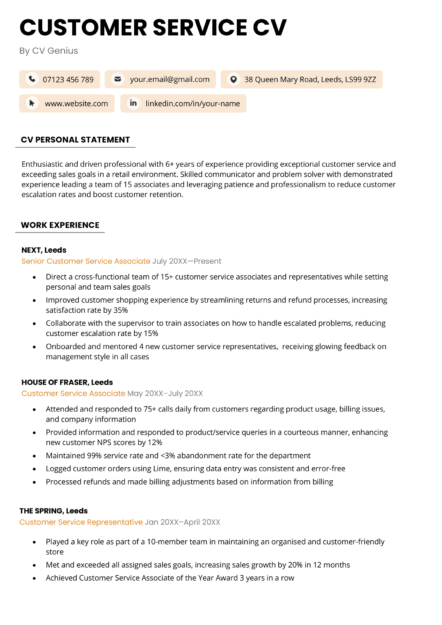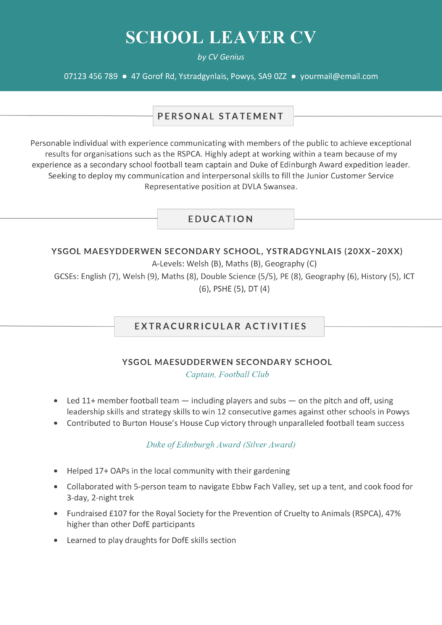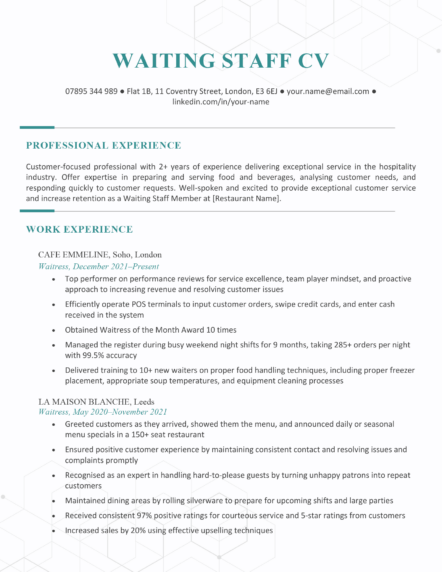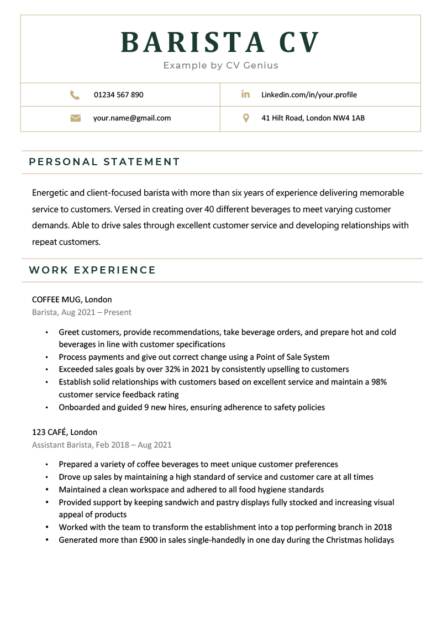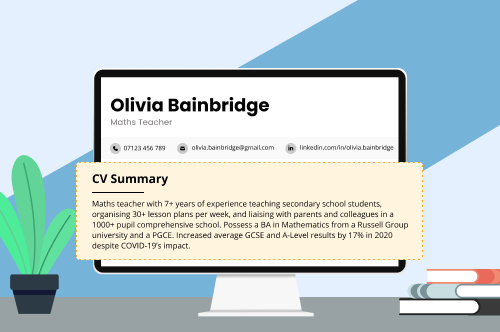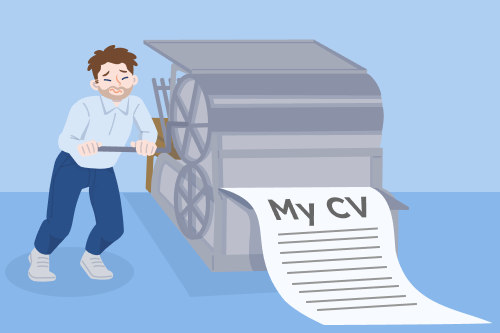Ensure your CV layout is structured to best highlight your unique experience and life situation.
Teenager CV Template (Text Format)
PERSONAL STATEMENT
Committed secondary school pupil presently completing my A-Levels. Excellent team player with leadership skills because of my experience as elected English Team Leader of the ABC Academy Homework Club for 2 consecutive years. Seeking a part-time position as a virtual assistant for DEF Company.
SKILLS
- Proficiency using Microsoft PowerPoint, Word, and Excel
- Fluent in reading and writing in both French and English languages
- Adept at data entry with 50 wpm typing speed
- Knowledgeable in creating and maintaining social media accounts on different platforms (Facebook, Instagram, TikTok, LinkedIn)
- Ability to follow instructions carefully
- Organisational skills
- Excellent team player
- Strong attention to detail
- Time management
VOLUNTEER EXPERIENCE
ABC Academy, English Homework Club Team Leader
September 2021–Present, Peterborough
- Organised Homework Club timetable and advertised the club schoolwide, resulting in 47% increase in regular attendees
- Negotiated with school kitchens and headteacher to allow for healthy snacks and drinks to be provided to Homework Club participants
- Implemented 2 revision timetables to improve student time management leading up to exams
The Peterborough School, Annual Debate Organiser
September 2020–June 2021, Peterborough
- Monitored and organised all logistics and programme flows for the Annual Debate
- Collaborated with 10 other team leaders by creating posters, leaflets, emails, and decorations for the event
- Coordinated with the supplies team for the duration of the event, spending 50% under budget for supplies and other resources
Academy Summer Camp, Participant
May 2016–March 2019, Peterborough
- Punctually attended programmes before, during, and after summer camp
- Participated actively in all summer camp tasks including making T-shirts, planting trees, and camping in the moors
- Assisted younger participants aged 10–14 by acting as group leader during scavenger hunts and helping camp supervisor keep attendance records during nature activities
EDUCATION
The Peterborough School
September 2014–June 2023, Peterborough
- A-Levels: English, French, History (predicted grades: A*, A, B)
- GCSEs: 10 A–C including English and Maths
AWARDS
- Senior Maths Challenge: Bronze (2018)
- Creative Writing Competition: Silver (2021)
- Duke of Edinburgh Award: Bronze (2018) and Silver (2019)
HOBBIES & INTERESTS
- Playing Scrabble and chess
- Reading books (fiction and non-fiction)
- Photography
- Violin (completed Grade 4)
How to write a teenager CV
Before you begin writing, make sure you know how to write a CV in a way that best emphasises your strengths.
Writing your teenager CV and finding a job is a great opportunity to get some real-world work experience and earn some extra cash.
Whether you’re gaining practical knowledge or financing your studies, watch this video so you can learn what steps you’ll need to make a CV as a teenager:
To build on this video’s advice, here are some tips on how to write a great teenager CV to help you get your first job.
1. Highlight your teenager CV skills
Whatever the field, employers will be looking for key skills on your CV that are relevant to the position you’re applying for. There are two kinds of skills: hard skills and soft skills.
Hard skills (also known as technical skills), show your experience with practical tasks you’ll likely be performing on the job. For instance, babysitting children, sewing, or speaking another language are all considered hard skills.
Here are some examples of technical skills you can include on your teenager CV:
- Software or computer skills
- Bookkeeping skills
- Proofreading skills
- Typing speed
Additionally, soft skills (or transferable skills) help employers see that you’ll work hard at the job and get along well with the rest of the team.
Have a look below at other teenager CV soft skills:
- Adaptability
- Attention to detail
- Communication skills
- Leadership skills
- Multitasking
- People skills
- Public speaking
- Teamwork
- Time management
- Working under pressure
Read the job advert and look for skills that you can add to your CV and describe when you make a cover letter. For instance, if the position is looking for a delivery driver, mention your excellent driving record in your key skills.
2. Write a strong education section for your teenager CV
For most teenagers, having a limited work experience section can make you feel underqualified for the job. To balance out your shorter work history, try making your education section a powerful part of your CV.
Prove to employers you’re fit for the role by listing your:
- school’s name and location
- A-Levels
- GCSE results
- NVQ and BTEC Level 2 grades
These academic details will help add value to your CV, especially if you lack work experience.
Write the dates you started and left (or will leave) school. Knowing when you left school or whether you’re still in education helps your future employer assess if you’re a good fit for the job.
Here’s how you can add details to your CV education section:

If you’re applying for online work based in another country, inserting the equivalent educational level helps your new employer understand where you’re at in your educational journey. Your GCSEs are the equivalent of a High School Diploma in the US, while your A-levels are the equivalent of AP exams.
3. Use a teenager CV template
You may be one out of several other teenagers applying for the same role, so catch your employer’s attention by using a pre-formatted CV template for the UK which saves you time and includes clear CV sections. A standard teenager CV layout should include these sections:
- CV title
- CV personal statement
- work or volunteer experience
- education
- key skills
- additional experience
Using a simple CV template also helps ensure you’re following an appropriate CV format and makes your CV easy to read.
Additionally, customise your teenager CV according to your previous experience by including sections like awards, recognitions, or foreign languages. As long as your experiences are relevant to the role you’re applying for, mentioning them is fine.
Write your hobbies and interests in the additional experience section, especially if they’re relevant to the job you want. For instance, if you’re applying to be a digital artist, mentioning that you enjoy drawing and sketching is a plus.
How do you start working as a teenager?
You can start working part-time as a teenager when you’re 13 years old. However, the only industries where you’ll need a performance licence are in television, theatre, and modelling.
In Scotland, Wales, and Northern Ireland, you can leave school at the age of 16 to take up full-time work.
In England, you should continue some form of education or training until you’re 18, but you can work up to 20 hours per week. By the time you’re 18, you’ll be considered an adult employee and should follow standard employment policies.
These are several industries where teenagers can apply for jobs:
- retail: (e.g., sales clerk, mystery shopper)
- food: (e.g., waiting staff, fast food crew, delivery driver)
- online or virtual: (e.g., digital arts, social media)
- personal services: (e.g., dog walking, car washing)
- publication: (e.g., leaflet delivery, paper rounds)
- education: (e.g., tutoring, language instructor, musical instrument teacher)
Look up available services in your community and use them to your advantage. If you notice that most of your neighbours have young kids, try asking if they’d like to hire you as a tutor. If you’re in a dog-friendly part of town, find out if your neighbours would like you to walk their dogs.
